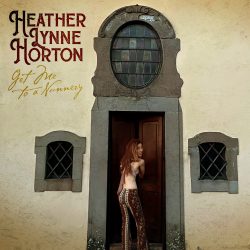High-quality music with compelling lyrics detailing the struggles in women’s lives.
 Chicago’s Heather Lynne Horton says that this record was inspired partly by the bravery of Sinead O’Connor, “chastised and persecuted for speaking for the broken, abused and the silenced, she stood in front of the freight train at the expense of her entire well-being”. This gives a clear view of what the record is all about; it continues O’Connor’s work by delivering a powerful feminist message about the trials and tribulations of women’s lives through their voices in the songs. The title of the album is “about how a man can dictate where a woman should go, the nunnery or the brothel, it’s such a fine line” and comes from the mouth of Hamlet where he insults his former lover Ophelia in a fit of anger.
Chicago’s Heather Lynne Horton says that this record was inspired partly by the bravery of Sinead O’Connor, “chastised and persecuted for speaking for the broken, abused and the silenced, she stood in front of the freight train at the expense of her entire well-being”. This gives a clear view of what the record is all about; it continues O’Connor’s work by delivering a powerful feminist message about the trials and tribulations of women’s lives through their voices in the songs. The title of the album is “about how a man can dictate where a woman should go, the nunnery or the brothel, it’s such a fine line” and comes from the mouth of Hamlet where he insults his former lover Ophelia in a fit of anger.
It is very impressive musically, a mixture of high-quality pop music with tinges of folk mixed in at times, although to call it pop seems to belittle the seriousness of the lyrics. Horton has been influenced by Joni Mitchell and Kate Bush but you can also hear eighties music with chugging synth, such as that from Alison Moyet, in some songs. There are some great rousing choruses, for example in the opening two tracks ‘After All This Time’ and ‘I Don’t Like Your Children’. The first of these is about a woman feeling alone, with a man who doesn’t love her. The latter is a criticism of the parent more than the children: “Cuz you’re bad and you’re hollow/ They got no one to follow”
Horton has a great voice that can remind you of O’Connor’s and adds beautiful harmonies to her lead vocal in tracks like ‘Ten Times’ and ‘Call a Spade a Spade’. ‘Ten Times’ argues that it is “Ten times as hard for a woman” to be heard compared to a man in our society. This recalls another inspiration for the album, where a Scottish DJ almost refused to play a Horton track because he didn’t like the photo on the CD sleeve of Horton “in the buff” chained to a shopping trolley to show the different societal expectations of women.
In ‘Call a Spade a Spade’, where there is conflict between a daughter and her father, there is folk violin added beautifully as there is on other tracks. In other places, lovely gentle lead guitar plays over acoustic backing. One example of this is on ‘Six Foot’ which describes an abusive relationship: “Tumbling down stairs kicked square in the teeth”.
Near the end, difficulties in relationships are addressed. ‘You Said So’ compares the singer’s hope when falling in love “We will laugh/ We will breathe love” with the emptiness she now feels. ‘Take Off’ has more mixed emotions, mentioning love for a partner but also loss of identity in being a mother and wife, frustration, and a feeling of wanting more.
The final track ‘Lin’s Never Ending Song’ was initially a private tribute to a Chicago DJ, recorded 20 seconds at a time each day. It is an instrumental that starts as an Irish lament but also has echoes of classical baroque and doesn’t really fit with the rest of her work. Horton wasn’t initially going to add it to the album, but understandably decided to put it in after his wife asked her to.
Horton says of herself: “I have to say the truth, too. We all have a responsibility to do so. I may be a housewife in Orland Park, but I have a lot of love and a lot of sadness and a lot of worry … and yet I have a pen.” It’s a fitting epitaph to this excellent album.


